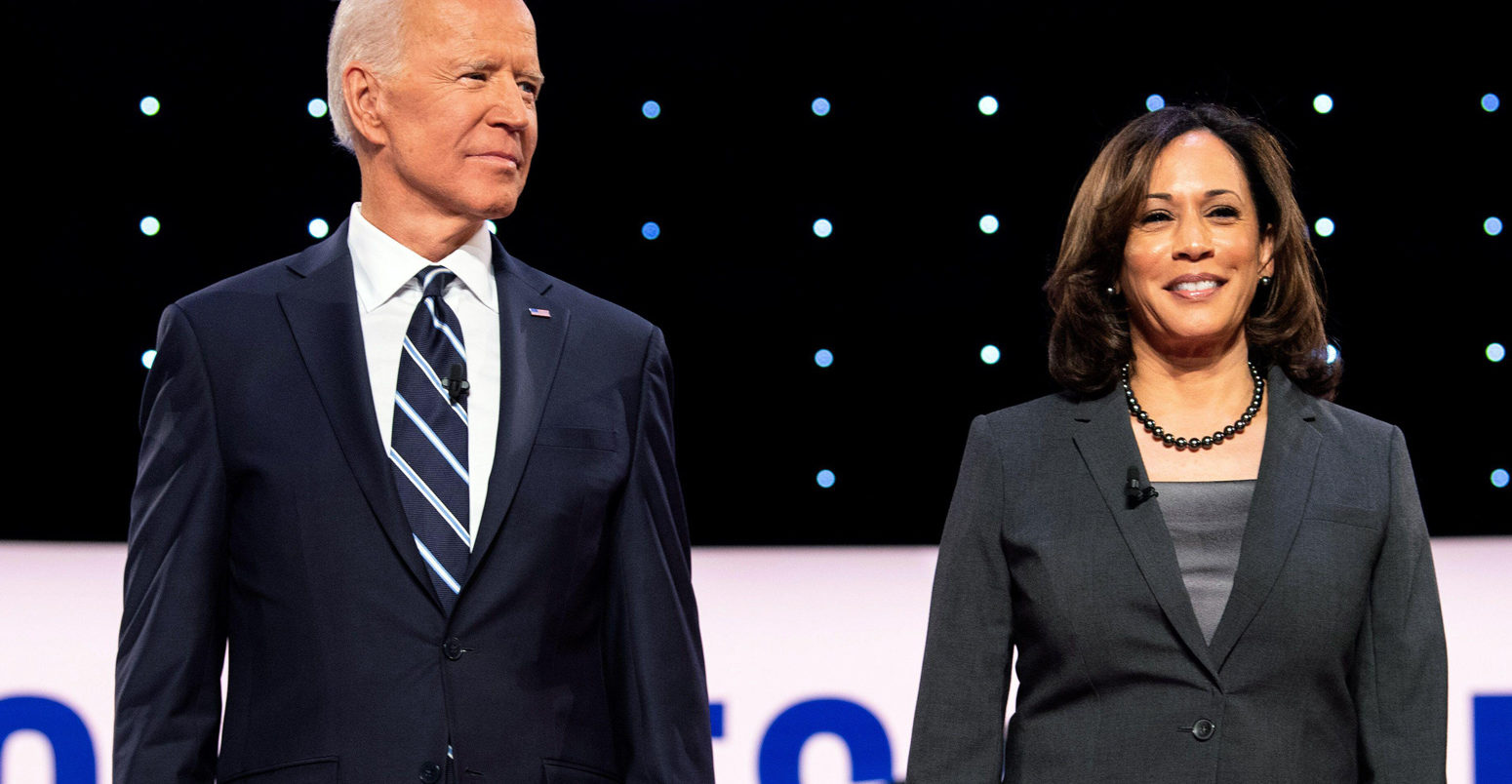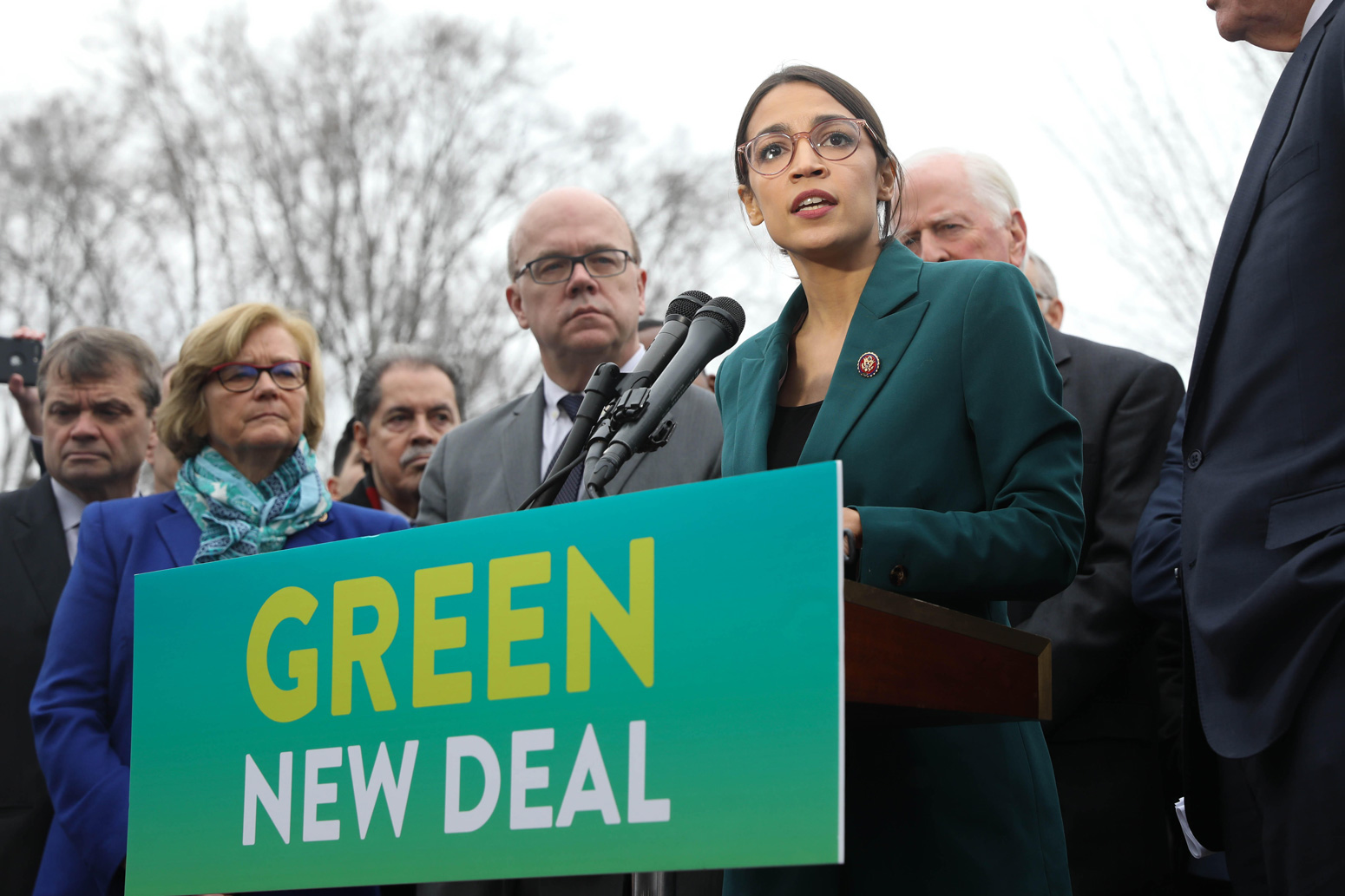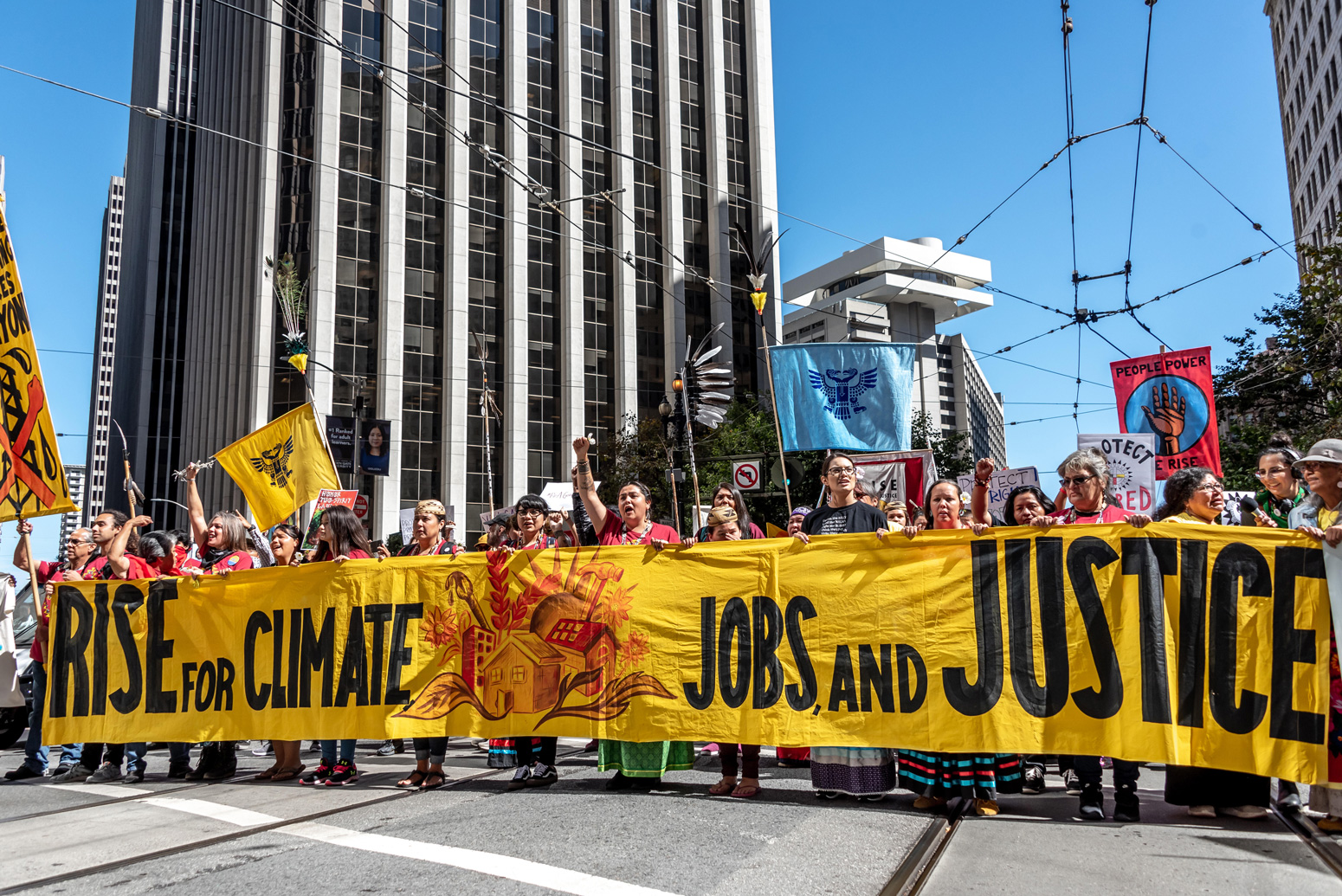
US election: Climate experts react to Joe Biden’s victory
Josh Gabbatiss
11.09.20Josh Gabbatiss
09.11.2020 | 1:21pmAfter a drawn-out election that saw narrow wins in a handful of battleground states, Joe Biden has emerged victorious over Donald Trump in the US presidential race.
While the incumbent president is still doing all he can to somehow discredit the voting, thoughts are now turning to what the result could mean for climate action after four years of a climate-sceptic populist residing in the White House.
Biden made climate change a cornerstone of his platform, pledging to spend $2tn on clean energy, re-join the Paris Agreement and achieve net-zero emissions by 2050.
However, his ability to realise these goals may be curtailed in the coming years by a likely Republican majority Senate.
Carbon Brief has asked an array of climate scientists and policy experts what Biden’s victory will mean for climate action in the US and around the world.
- Dr Rachel Cleetus: “President-elect Joe Biden and vice-president elect Kamala Harris’ victory marks a new day in the fight for bold, just and equitable climate policy in the US – and also means that the US will rejoin the global community in recommitting to the goals of the Paris Agreement.”
- Tasneem Essop: “The biggest significance of a Biden-Harris victory is the fact that the US will now have a leadership that believes in science.”
- Peter Betts: “Biden’s victory massively enlarges the envelope of the possible for COP26 in Glasgow. The world’s biggest economy is back.”
- Dr Valérie Masson-Delmotte: “I would like to express the hope that the US, which has such an impressive research community…will enhance its support for science and strengthen science-based decision making.”
- Prof Piers Forster: “Following Biden’s win, the US will re-join the Paris negotiations and other nations will be compelled to join the net-zero club and, in 30 years time, we may just get there.”
- Carlos Fuller: “Meaningful action toward [net-zero] domestically, together with a re-energised role in the negotiation process, will have an outsized effect globally and encourage other large emitters to step up.”
- Sue Reid: “While opportunities for sweeping policy reform remain uncertain as control of the US Senate hangs in the balance, much of Biden’s $2tn climate action plan can be unleashed regardless of the outcome.”
- Li Shuo: “There are, unfortunately, not a lot of issues on which the interests of [China and the US] are aligned. Climate change remains one of the few exceptions.”
- Alden Meyer: “To have the credibility to call on others to increase their climate ambition, president Biden will need to put forward an ambitious US 2030 nationally-determined contribution (NDC) well in advance of next November’s climate summit in Glasgow.”
- Dr Niklas Höhne and Dr Bill Hare: “If president-elect Joe Biden goes ahead with his net-zero emissions pledge by 2050 for the US…a tipping point is being approached that puts the Paris Agreement’s 1.5C limit within reach.”
- Dr Joeri Rogeli: “The announced investments in clean energy, together with support for US regions to transition away from fossil fuels, presents a balanced plan, broadly aligned with the scientific evidence.”
- Prof Robert Bullard: “The Biden-Harris victory ushers in desperately needed new leadership at the top and a welcome sense of urgency for developing real solutions for achieving environmental and climate justice, economic justice, energy justice, health justice and racial justice for all.”
- Dr Takeshi Kuramochi: “While Biden may not be able to push through much of his climate agenda without Congress, he can still make a significant impact, for example through Environmental Protection Agency (EPA) regulations.”
- Dr Farhana Sultana: “This was a climate election since a large majority of voters noted that they were concerned with climate breakdown. Biden has a climate plan and a mandate and he has promised to listen to scientists…which is vastly different from the last four years of war on science.”
- Prof Michael Mann: “If Democrats win the presidency, but we have a nearly 50:50 split Senate, there is real opportunity for meaningful climate legislation, but it will require some degree of compromise.”
- Helen Mountford: “An immediate priority is to realise the significant job and economic benefits that a green stimulus can deliver.”
- Dr Maisa Rojas Corradi: “Biden’s victory will give a tremendous momentum to climate action, a momentum that was building up after the giant Asian countries announced carbon-neutrality compromises recently.”
- Sonam P Wangdi: “We look forward to the US submitting an NDC that reflects its highest possible ambition…Scaled up climate finance to support developing countries to address climate change will be a key piece of this.”
- Saad Amer: “As Biden builds back better, he must aggressively integrate a clean, just, sustainable economy into any Covid-19 relief and economic stimulus packages he implements.”
- Prof Ricarda Winkelmann: “A win for Joe Biden and Kamala Harris means that the door to reaching net-zero greenhouse gas emissions by 2050 remains open.”
- Farhana Yamin: “Biden is committed to the US re-joining the Paris Agreement. But that’s the easy part. The question on everyone’s lips is whether and how a Biden administration can make good on the ambitious ‘build back better’ package.”
- Nigel Purvis: “While recognising that the US has been an unreliable ally on climate change and needs to work harder to reduce emissions at home, Biden knows that even today there is no substitute for American leadership at the global level.”
- Dr Daniel M Kammen: “The development of the president-elect’s clean electricity by 2035 plan is particularly astute because it shows how clearly innovation in science, technology and markets as well as climate science factor into his plans.”
 Dr Rachel Cleetus
Dr Rachel Cleetus
Policy director, climate and energy programme
Union of Concerned Scientists
President-elect Joe Biden and vice-president elect Kamala Harris’ victory marks a new day in the fight for bold, just and equitable climate policy in the US – and also means that the US will rejoin the global community in recommitting to the goals of the Paris Agreement. I find myself filled with relief and hope after what has been a nightmarish four years of the Trump administration reversing or halting numerous federal climate policies, sidelining and silencing scientists and trying to tamper with scientific reports.
The US – like many other parts of the world – is reeling from the compounding effects of the Covid-19 pandemic, the economic crisis and the on-going climate crisis. The crisis of systemic racism also looms large in our nation’s consciousness. This year has brought a relentless barrage of wildfires, hurricanes, heatwaves and floods that have taken a devastating toll on people, particularly communities of colour and those who live in poverty. These challenges remain daunting today. But now we have a US president who has said he will actually work to address these problems, instead of one who lies relentlessly about their very existence, while actively making them worse.
The Biden administration must use its full powers, and work with Congress, to deliver on some critical priorities, outlined in this blog post. I don’t want to gloss over how difficult it will be to secure these policies, especially if the closely divided Congress fails to step up and do its part. We have yet to see a strong bipartisan commitment to climate action. The outcome of the Senate election, which is still not final, indicates that right now there isn’t a straightforward pathway to getting the 60 votes needed in the Senate to pass a sufficiently ambitious climate bill. And we will continue to face opposition from powerful fossil fuel interests trying to stymie progress on climate action while enriching themselves.
Addressing climate change will take deep commitment over a long time, well beyond the term of any one administration or congressperson. This highlights the continued importance of the global climate movement, which is now the broadest, most diverse, and most powerful it’s ever been. We may not agree on every policy detail, but we all see the urgent need for bold action, guided by science and fairness. The voices of ordinary people are vital in the fight ahead, putting pressure on policymakers and pushing the envelope of what is considered “politically feasible”.
 Tasneem Essop
Tasneem Essop
Executive director
Climate Action Network
President-elect Biden’s commitment to bring the US back into the Paris Agreement will provide an urgent and critical contribution towards a truly global effort to combat climate change. It could not have come sooner. The climate crisis is a global challenge needing a global response and global solidarity and done in a manner that is fair and just.
It is clear that Biden’s commitment to re-joining the Paris Agreement will not merely be a symbolic act. His victory provided him a clear mandate to act on climate. It is backed up by a strong climate platform based on the Green New Deal and a slew of climate policies already on the table.
The sustained hard work, courageous and audacious activism by the youth, grassroots, frontline and BIPOC [black, Indigenous and people of colour] communities during the past few years, in the challenging context of a country led by a president who did not believe in the science and denied the very existence of climate change, must be acknowledged and celebrated. It is due to these efforts that climate change is a top political priority for Biden, Harris and the Democratic Party. This makes me more optimistic that there will be real and meaningful action at a domestic level in the US, which in the end is what we need to address the climate crisis.
Real climate action in the US, and joined by others, will contribute to climate justice around the world, where poor and vulnerable people and communities are already bearing the burdens of the worst impacts of climate change. Finally, the biggest significance of a Biden-Harris victory is the fact that the US will now have a leadership that believes in science, knows that climate change is real and a threat and is committed to supporting united and multilateral action. Welcome back.
 Peter Betts
Peter Betts
Associate fellow (also former lead climate negotiator for the UK and the EU at COPs)
Chatham House
Biden’s victory massively enlarges the envelope of the possible for COP26 in Glasgow. The world’s biggest economy is back.
The US will need to come forward with an ambitious new nationally determined contribution (NDC) and climate finance. The nation can be expected to deploy its huge diplomatic clout in pressing for ambition from others too, as well as on broader climate challenges, from developing country debt to green recovery to reform of the international financial institutions. Of course huge challenges remain, but this is a massive injection of momentum.

 Dr Valérie Masson-Delmotte
Dr Valérie Masson-Delmotte
Co-chair, Working Group I
Intergovernmental Panel on Climate Change (IPCC)
I am just coming out of three days of intense brainstorming to revise the summary for policy makers of the Intergovernmental Panel on Climate Change (IPCC) Working Group I report, on the physical science basis of climate change, building on review comments from the scientific community and from governments on the earlier draft, and with authors who are scientists from all regions of the world.
I would like to express the hope that the US, which has such an impressive research community and contribution to the production of new knowledge, in all fields, including climate change, will enhance its support for science and strengthen science-based decision making. If only greenhouse-gas emissions were monitored as closely as ballot counting…
 Prof Piers Forster
Prof Piers Forster
Professor of climate physics and director
Priestley International Centre for Climate at theUniversity of Leeds
For me it’s all about optics. We are at a crucial time in raising our game, with countries declaring more ambitious emission reduction targets in time for the COP meeting next year. The UK, EU and China have already committed to net-zero by 2050 or soon after. Biden has committed the same. Following Biden’s win, the US will rejoin the Paris negotiations and other nations will be compelled to join the net-zero club and, in 30 years time, we may just get there.
 Carlos Fuller
Carlos Fuller
Lead climate negotiator
Alliance of Small Island States (AOSIS)
President-elect Biden has demonstrated his commitment to act on climate change by announcing that he will take the critical step of re-entering the Paris Agreement. Even more significantly, he has set the target of taking US emissions to net-zero by 2050, the most ambitious climate platform of any elected US presidential candidate to date. Meaningful action toward this domestically, together with a re-energised role in the negotiation process, will have an outsized effect globally and encourage other large emitters to step up. Taken together with the stated ambitions of the EU and China, the Alliance of Small Island States (AOSIS) is optimistic that we stand on the cusp of achieving a 1.5C global pathway.
That being said, this election has exposed stark divisions in the US regarding the direction the country should go, particularly on climate. For this new administration’s climate ambitions to be sustained in the long-term, the next four years will be critical to ease these divisions and move the country assuredly along this new path. It will require inspirational and decisive leadership. Still, the science is firmly on Mr. Biden’s side, and increasingly the economic argument as well.
AOSIS, therefore, stands ready to work constructively with his administration in maintaining the momentum of this turning tide.
 Sue Reid
Sue Reid
Principal advisor, finance
Mission 2020
The US now has a golden opportunity to recover from its four-year-long status as a rogue nation when it comes to action on climate. With the Biden administration expected to commit to net zero emissions by 2050, this would bring the entire G7 and the majority of the G20’s emissions into line with similar ambition, reinforce the global direction of travel in accelerating the transition away from high-carbon resources such as coal,oil and gas, and send a reinforcing signal to global investors.
While opportunities for sweeping policy reform remain uncertain as control of the US Senate hangs in the balance, much of Biden’s $2tn climate action plan can be unleashed regardless of the outcome. Through executive orders and administrative actions, the new Biden administration can reverse the Trump administration’s retrograde executive actions geared toward curbing climate action and, by contrast, catalyse progress on clean energy transition.
Options that do not require Congressional action range from phasing out fossil fuel extraction on public lands to ensuring that companies and investors assess, manage and disclose their exposures to climate-related risks, building from recent recommendations of the Commodities Future Trading Commission (CFTC). In addition, a strong majority of people in the US, across party lines, support stepped-up investment in clean energy. Accordingly, there is some potential for bipartisan cooperation and Congressional action to reboot the economy with new clean energy incentives and investments at scale even if the Senate does not find itself under new leadership.
By weathering the temporary departure of a nation that both is responsible for emitting more emissions cumulatively than any other and that also was centrally involved in creating the Paris Agreement’s architecture, the agreement has demonstrated its durability as all other nations remained on board. The world, thankfully, did not wait for the US to return to the climate action table. Now, the race to net-zero emissions and climate stability will be rejoined not a moment too soon by a nation under fresh leadership that intends to make up for lost time.
 Li Shuo
Li Shuo
Senior climate and energy policy officer
Greenpeace East Asia
Biden’s win will prevent the worst outcome for the global climate agenda. But to truly lead, the new US administration has its work cut out for itself. Strong near-term action is the minimum required to build up trust with other countries.
A lot has changed over the last four years that will make the future US-China climate engagement more difficult to predict than before. The bilateral relationship has deteriorated to a historical low and public perception of each nation has hardened.
Most recently, with the carbon neutrality announcement, China has demonstrated its willingness to pursue climate ambition without the US. All of these present both challenges and opportunities to work out the future G2 climate relationship. The fundamentals have not and will not change, though – to solve our climate problem, the most powerful nations have to row in the same direction. There are, unfortunately, not a lot of issues on which the interests of the G2 are aligned. Climate change remains one of the few exceptions.
 Alden Meyer
Alden Meyer
Independent climate policy strategist (former director of strategy and policy at the Union of Concerned Scientists)
President-elect Biden has pledged to “lead an effort to get every major country to ramp up the ambition of their domestic climate targets”.
But to have the credibility to call on others to increase their climate ambition, president Biden will need to put forward an ambitious US 2030 NDC well in advance of next November’s climate summit in Glasgow. This NDC should be based on three main elements:
- Making full use of executive authority under the Clean Air Act and other statutes to reduce emissions in the electricity and transportation sectors, constrain methane emissions from oil and gas production and cut emissions from heavy industry like steel and cement.
- Making massive investments in renewables, energy efficiency and storage, electric vehicles and other climate-friendly technologies, as a key component of the Covid-19 economic recovery package that will be the immediate priority for the Biden-Harris administration.
- Putting forward legislation covering a range of sectors, such as a clean electricity standard, incentives for healthy soil practices to sequester carbon on farms, and tax incentives for wind and solar energy investments, electric vehicle purchases, and other zero-carbon technologies.
In addition to federal action, the NDC should reflect the bold actions being taken by the states, cities, companies and others that have committed to meet US obligations under the Paris Agreement as part of the We Are Still In coalition. They are pledging to broaden and deepen their ambitious climate actions, which will help raise the level of ambition the US can put forward in its 2030 NDC.
The element that is least certain in all of this is climate and energy legislation, particularly if Republicans maintain control of the Senate. Some proposals, such as healthy soils incentives for farmers or tax credits for clean technologies, can attract bipartisan support. Others, such as a price on carbon or clean energy standards, would face more difficult prospects in a Republican Senate. The Biden-Harris administration should consult broadly with Congress, governors, mayors, business, labour, and other constituencies so as to ensure that the 2030 US NDC It puts forward has robust support.
It should aim for 2030 emissions reductions of at least 45-50% below 2005 levels. If there hasn’t been sufficient legislative action by Congress to achieve such a goal before the NDC needs to be submitted, one option could be to make a portion of the reduction commitment conditional on additional action by Congress. This could include the period after the 2022 elections, when Republicans could well lose several Senate seats and thus control of the Senate.
The Biden-Harris administration should also update the mid-century greenhouse gas strategy that was released in late 2016 by president Barack Obama. It should lay out clearly how the US can achieve the net-zero emissions target by 2050 goal that Biden campaigned on. This revised plan should also be put forward in advance of COP26 in Glasgow.
Other actions are needed, including delivering the unfulfilled $2bn portion of the Obama-Biden administration’s $3bn pledge to the Green Climate Fund and pushing for Senate ratification of the Kigali Amendment to the Montreal Protocol in order to reduce production and consumption of hydrofluorocarbons.
If president-elect Joe Biden goes ahead with his net-zero emissions pledge by 2050 for the US, this could shave 0.1C off global warming by 2100, according to our Climate Action Tracker. Coupled with China’s pledge to bring emissions to net-zero before 2060, and the EU, Japan and South Korea’s commitments to reach net-zero by 2050, a tipping point is being approached that puts the Paris Agreement’s 1.5C limit within reach.
 Dr Joeri Rogeli
Dr Joeri Rogeli
Director of research and lecturer in climate change and the environment
Grantham Institute for Climate Change at Imperial College London
The Biden-Harris victory lights a beacon of hope for climate action. Most of these hopes come from the announced plan for a clean energy revolution and environmental justice. If implemented, the plan will be transformational in many aspects.
First, the Biden-Harris plan is ambitious domestically, with a decisive commitment to achieving net-zero emissions no later than 2050. The announced investments in clean energy, together with support for US regions to transition away from fossil fuels, presents a balanced plan, broadly aligned with the scientific evidence. The details, however, are unclear at this stage.
In isolation, I estimate that a US net-zero target would chisel off about a tenth of a degree of warming over this century. In combination with targets from the EU, China, South Africa, Japan, and South Korea, it quickly adds up to much more than half a degree – a decisive shift towards achieving the Paris Agreement.
Second, the Biden-Harris plan is also ambitious internationally. It expresses the intention to reassert a global leadership role in climate change diplomacy by recommitting to the Paris Agreement and integrating climate change in its foreign policy efforts and national security strategies. The importance of this commitment cannot be overstated and raises expectations that their proposed ambitious domestic action will also spill over internationally.
Finally, besides these promises, there is also hope that they can deliver. A Republican controlled US Senate will undoubtedly slow down the pace. However, Biden and Harris were elected with the support of many progressive voters who had Bernie Sanders or Elizabeth Warren as their first choice. This progressive support, including inspiring young voices inside the party, such as Alexandria Ocasio-Cortez and Ilhan Omar, now translates into internal political pressure to deliver on the promises made.

 Prof Robert Bullard
Prof Robert Bullard
Distinguished professor of urban planning and environmental policy
Texas Southern University
The Biden-Harris victory ushers in desperately needed new leadership at the top and a welcome sense of urgency for developing real solutions for achieving environmental and climate justice, economic justice, energy justice, health justice and racial justice for all.
 Dr Takeshi Kuramochi
Dr Takeshi Kuramochi
Senior climate policy researcher
NewClimate Institute
If the president-elect goes ahead with his plan to achieve net-zero emissions by 2050 for the US, this will make half of global GHG emissions covered by national level net-zero commitments. Together with the US rejoining the Paris Agreement, it would mark the real start of the global “race to zero”.
That said, the president-elect’s commitment to 2050 net zero will be tested soon when the US has to submit its 2030 climate target to the UN. The possible Republican control over the Senate will make it all the more challenging. However, a 2050 net-zero target would all be pie in the sky without an ambitious 2030 target and a well-designed implementation plan. The same can be said for all other countries with net zero commitments, including China, EU, Japan and South Korea.
While Biden may not be able to push through much of his climate agenda without Congress, he can still make a significant impact, for example through Environmental Protection Agency (EPA) regulations. Fuel economy and emission standards for vehicles consistent with a 2050 net-zero target implemented in the world’s second-largest car market would not only lead to significant domestic greenhouse-gas emissions reductions but also help accelerate the transformation of the global car manufacturing industry.
 Dr Farhana Sultana
Dr Farhana Sultana
Associate professor in the department of geography
Syracuse University
Joe Biden being elected as president of the US is significant for climate action, not just nationally but internationally in my opinion. This was a climate election since a large majority of voters noted that they were concerned with climate breakdown. Biden has a climate plan and a mandate and he has promised to listen to scientists and scholars to help inform him, which is vastly different from the last four years of war on science and knowledge.
This should include addressing climate breakdown globally but also in hotspots, such as the Amazon, and also funding climate loss and damage happening across the Global South. I also hope there will be fossil fuel divestment and increasing renewable energy investments, but also discussions of reducing consumption habits domestically.
At the same time, serious discussion is needed on production patterns that rely on extractive and exploitative industries that all contribute to climate injustices globally, including industrial agriculture, and how these need to change. This means the US has to engage in discussion and concerted action on both mitigation and adaptation at both home and abroad, since globalisation and trade ties connect the country to other people’s ecosystems and societies.
A Biden presidency also signals to me that there will be more meaningful climate action and discussions on climate justice domestically, at the national, state, county, and municipality levels in coordinated ways. It means that there will likely be serious considerations of the Green New Deal or some form of holistic climate action.
Addressing climate justice also means addressing issues of racial injustices and gender injustices that are linked to climate injustices. Biden has mentioned that he will work on a range of issues of environmental justice, so my hope is that the scientific and scholarly community can work with his administration to make this materialise. For this to happen meaningfully, his administration should be diverse and representative of different communities and constituents.
One of the other things that I am hopeful for with the Biden presidency is better US engagement on issues such as climate migration and climate refugees. The US has a responsibility to address the outcomes of climate-induced displacement and dispossession elsewhere, which means addressing immigration and detention policies.
 Prof Michael Mann
Prof Michael Mann
Distinguished professor of atmospheric science
Penn State University
The sobering reality is that even if every country meets their commitments under Paris, and many, including the US and EU are currently falling short, that gets us less than half way to where we need to be. That is, on a path to limiting warming below 2C, let alone the more stringent 1.5C many are now calling for. So Paris is a good starting point, but we need to go well beyond Paris now to achieve the reductions that are necessary.
A Biden victory ushers in a new era of global cooperation and allows us to repair much of the damage that was done to our reputation on the world stage by Trump over the past four years.
Biden has put forward a bold climate plan with ambitious targets for reducing carbon emissions and support for both regulatory and market-driven policy measures. If Democrats win the presidency but we have a nearly 50:50 split Senate, there is real opportunity for meaningful climate legislation but it will require some degree of compromise.
Though my new book, The New Climate War, went to press this summer, it anticipates precisely where we’ll likely be given the anticipated makeup of the Senate: “Given an even modestly favorable shift in political winds, one could envision [a bold climate bill] passing the House and moving on to the Senate with a half-dozen or more moderate conservatives crossing the aisle, joining with Senate Democrats to pass the bill within the next year or two.”
In short, I’m cautiously optimistic that we’ll see meaningful action here in the US and a reassertion of global leadership on climate.
 Helen Mountford
Helen Mountford
Vice president for climate and economics
World Resources Institute
President-elect Biden has laid out the most ambitious climate plan of any incoming administration in the US and it turns out this is exactly what Americans wanted. The 2020 election saw a landslide of voters calling for stronger action to combat climate change. Fox News exit polls found that 70% of voters support increased government spending on green and renewable energy, and 72% were somewhat or very concerned about the effects of climate change.
Biden has clearly stated that one of his first actions as president will be to re-enter the Paris Agreement. This is an extremely important step towards restoring trust internationally. But on its own won’t be enough. It will need to be backed up with a bold national climate plan that puts the country on a path to a net-zero future.
The World Resources Institute suggests that the United States should commit to reduce its emissions by around 45-50% by 2030 compared with 2005 levels. A report on Accelerating America’s Pledge that we produced with partners found that expanded action by cities, states and businesses alone is on track to potentially reduce emissions by 37% by 2030. With renewed leadership at the federal level under the Biden administration, a target of 45-50% by 2030 is both ambitious and achievable.
An immediate priority is to realise the significant job and economic benefits that a green stimulus can deliver. Investing in solar power, energy efficiency, and public transport can generate over twice as many jobs per dollar spent as investments in coal and gas, for example..
It may be some time before we know which political party will control the US Senate, but even if Republicans keep control president Biden can take a number of significant actions to decarbonise the US economy. This includes reinstating and strengthening public health and environmental safeguards, such as setting standards for clean cars, more efficient appliances and emissions from steel and cement production. There is also strong bipartisan support for passing legislation for addressing hydrofluorocarbons (HFCs).
Finally, the Biden administration can help catalyse an ambitious climate agenda by empowering states, cities and businesses to complement federal efforts to advance climate action.
 Dr Maisa Rojas Corradi
Dr Maisa Rojas Corradi
Director of the Centre for Climate and Resilience Research and COP25 scientific coordinator
University of Chile
Biden’s victory will give a tremendous momentum to climate action, a momentum that was building up after the giant Asian countries announced carbon-neutrality compromises recently. This means that in this crucial decade we will be able to tackle the climate crisis seriously. But it also means that the US can count on their scientists again for an evidence-based roadmap for all the transformations ahead.
Finally, I think that having a first woman vice-president is also a very positive sign of our times, where we need all on board to solve the multiple crises we are in.
 Sonam P Wangdi
Sonam P Wangdi
Chair
Least Developed Countries (LDC) Group
A bold, cooperative global response is urgently needed to address climate change. Joe Biden has been clear with his intention to re-join the Paris Agreement, demonstrating commitment to ensuring the US plays its part in holding global warming to 1.5C above pre-industrial levels, increasing the abilities of countries and communities to adapt to the impacts of climate change, and making finance flows consistent with low-carbon, climate-resilient development pathways.
The US is a major emitter. Ambitious domestic and international climate action at pace and at scale is urgently needed to ensure the safety and survival of the world’s most vulnerable. Biden’s victory offers hope for climate action in the US and around the world.
We look forward to the US submitting an NDC that reflects its highest possible ambition, and its respective responsibilities and capabilities. Scaled up climate finance to support developing countries to address climate change will be a key piece of this.

 Saad Amer
Saad Amer
Co-founder
Plus1Vote
Rejoining the Paris Accord via executive order is a first step, but it is symbolic in terms of impact. Globally, the Paris Accord has done little to reduce emissions.
While Biden’s victory is a major step forward for the global climate movement, we must acknowledge that a moderate approach to climate action will be fatal. We can no longer frame conversations based on 2030 or 2050 deadlines to push off action. As Biden builds back better, he must aggressively integrate a clean, just, sustainable economy into any Covid-19 relief and economic stimulus packages he implements, or there will be no way to avert a planetary climate crisis.
The IPCC makes it clear that we must reduce global emissions 7.5% every year from 2020 to 2030. The US has already lost out on reducing emissions in 2020. Biden must take action in his first 100 days in office to not only make up for 2020 emissions, but continue his first year in office to put the US on a trajectory to reduce emissions an additional 7.5%. This means Biden cannot invest into any new fossil fuel infrastructure and includes an outright ban on fracking.
This is a chance for Biden to reposition the US as a global leader. Anything short of significant emissions reductions will lock the world into a pattern headed toward a climate crisis.
 Prof Ricarda Winkelmann
Prof Ricarda Winkelmann
Professor of climate system analysis
Potsdam Institute for Climate Impact Research (PIK)
A win for Joe Biden and Kamala Harris means that the door to reaching net-zero greenhouse gas emissions by 2050 remains open. If they really step up to the challenge, this can be a tipping point towards long-term climate stabilisation and, ultimately, an important step on our path towards a safe and just future for people and planet.
 Farhana Yamin
Farhana Yamin
Climate change lawyer, activist and representative for the Marshall Islands at COP21
Two years ago, around 250 activists from the youth-led organisation Sunrise Movement, accompanied by Alexandria Ocasio-Cortez, the youngest member of Congress in US history, descended on Nancy Pelosi’s office for a sit-in. They were calling for a “green new deal” that would simultaneously tackle the twin crises of climate change and inequality.
These young people helped secure the Biden-Harris ticket. It was because of their actions that Biden-Harris ran an ambitious climate action agenda attractive to huge numbers of young and old Democrats. It also appealed to key parts of the Trump base, which split in the old industrial heartlands of Pennsylvania, Michigan and Wisconsin, as well as winning over states such as Arizona with significant indigenous native American voters.
We know Biden is committed to the US re-joining the Paris Agreement. But that’s the easy part. The question on everyone’s lips is whether and how a Biden administration can make good on the ambitious “build back better” package.
This transformational agenda to go net-zero by 2050 and to do so justly could be permanently stalled if the Republicans continue to control the Senate and filibuster every proposal for legislation and budget. Or if the Supreme Court uses its majority to strike down regulatory actions taken by other branches of government such as the EPA.
The cards seemed stacked against Biden, but he has the people on his side – not just in the US, but all over the world. Tactically, he can play his hand better by making full use of his
executive powers to repeal the damaging orders Trump put in place as well as allow states
Such as California and other pioneers to step up their actions. He could increase his powers by declaring a national climate emergency because, frankly, there is one.
He can also play a significant foreign policy role by supporting alliances and coalitions, such as the Climate Vulnerable Forum. COP26 provides the key opportunity for Biden to forge ahead on the basis of uniting the world on emergency action. A first step would be to prepare the highest ambition revised NDC and get the ball rolling on an inclusive high-ambition coalition. This should include all developing countries who rightly want a say in world governance on how we collectively steer the world to a greener, fairer and more compassionate world based on climate justice.
 Nigel Purvis
Nigel Purvis
President and CEO (also former senior US climate negotiator)
Climate Advisers
Joe Biden will soon become the most pro-climate US president in history. He will rejoin the Paris Agreement on his first day in office and help rally the world toward achieving carbon neutrality by mid-century.
The Biden administration will face massive resistance from Republicans in the US Senate, of course. Unless Democrats take control of that body in January when final Senate elections occur, Biden will probably not be able to secure passage of traditional climate laws, such as a carbon tax or a cap-and-trade system. Yet, the US presidency is an enormously powerful position and Biden will use his influence to make progress on four climate fronts simultaneously.
First, he will propose and hopefully secure up to $2tn for a green recovery from the global pandemic. Second, Biden will instruct his cabinet to reduce US emissions through new domestic climate regulations, specifically regulating emissions from vehicles, electricity generation, methane and more. The threat of regulation will motivate US companies and investors to reduce emissions in significant ways, as was the case during the Obama years when US emissions declined dramatically.
Third, Biden will move forward the public debate on climate change and that, too, will drive the US economy to decarbonise by changing social and business norms, as well as by building new public support for climate programmes and regulations. Biden will help keep climate in the spotlight as it needs to be.
Finally, Biden will use his considerable foreign policy experience and diplomatic skills to strengthen global climate ambition in partnership with other countries. While recognising that the US has been an unreliable ally on climate change and needs to work harder to reduce emissions at home, Biden knows that even today there is no substitute for American leadership at the global level. By joining with Europe and others who have been leading the charge during the Trump years, he will help craft a new and powerful coalition for climate action that hopefully will include China, India and other major economies. Joe Biden cannot solve the climate crisis and the US will probably fall short of achieving all that science requires, but the next four years are going to be a million times better than the last four.
 Dr Daniel M Kammen
Dr Daniel M Kammen
Professor of energy
University of California, Berkeley
First and foremost, the Biden-Harris victory is an international sigh of relief: science, social justice and both domestic and global partnerships to address climate change are now back on the agenda in the US.
More than any specific action, the commitment that president-elect Biden has already shown to a science-driven response is welcome worldwide. One example of the urgency – and now relief – is that in an unprecedented move, scientific journals worldwide, from Science to Nature to Scientific American all endorsed the Biden-Harris ticket.
The development of the president-elect’s clean electricity by 2035 plan is particularly astute because it shows how clearly innovation in science, technology and markets, as well as climate science factor into his plans. The performance and price progress that renewables and energy storage have followed this past decade – and the need to accelerate global action – provide the tools and motivation for the Biden-Harris energy and climate plan. However, what has not happened is to bring those benefits to low-income communities and to people of colour.
Enter the other side of the Biden-Harris platform: a focus on social and climate justice.The plan calls for 40% of federal spending in this area to meet the needs of under-served communities, communities of colour and areas not meeting air and water quality standards. By acknowledging the legacy of systemic racism and translating that into an actionable federal agenda, president-elect Biden has built a critical bridge connecting the scientific push for climate protection to the social movement that it arguably must become. Vice president-elect Harris is co-author of a landmark climate justice bill.
The clean energy economy can and will produce millions of new and secure jobs. The employment and health benefits of this expansion can be hugely empowering for disadvantaged communities, and it provides a means of reinvesting in infrastructure across the country. For example, the oil-and-gas sector is well positioned to play a major role in geothermal energy, offshore wind, hydrogen production and carbon capture and storage (CCS). Investment in electric vehicle manufacturing, charging infrastructure, and rebuilding mass-transit all have significant social justice benefits.
With zero-carbon and clean energy targets in place for the EU – and recently announced for China, South Korea and Japan – the Biden-Harris targets also prime US industry for export markets worldwide.



